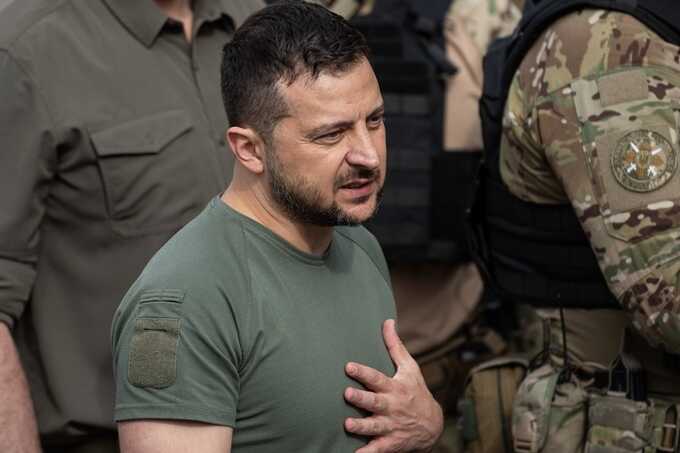Zelenskyy asks Europe to help raise pay for Ukrainian soldiers

He also plans to seek help from his western partners to secure an additional seven Patriot air defence systems following confirmation from Germany and Norway that they would soon send three to Kyiv to help defend against Russia’s escalating missile and drone bombardments.
Speaking to reporters in Kyiv on Thursday, Zelenskyy acknowledged that Ukraine’s allies had so far declined to contribute to military salaries, focusing their support instead on arms and equipment. But he believes he can change their minds, saying that his “service members themselves can be the weapon that protects everyone”.
After more than three years of war, Kyiv’s push to attract new recruits is facing serious problems. A broad mobilisation campaign has become increasingly unpopular, fuelled by online videos of military recruitment officials forcibly detaining men on the streets, stuffing them into vehicles and sending them to military training centres. Uncertainty about how long the war will go on — and the lack of any promise of demobilisation — have also contributed to popular discontent. Lowering the mobilisation age from 27 to 25 has done little to help, and Zelenskyy has rebuffed western advice to drop it any further, citing demographic challenges and lack of public support.
President Volodymyr Zelenskyy acknowledges to journalists this week that western allies have not contributed to Ukraine troop salaries © UKRAINIAN PRESIDENTIAL PRESS SERVICE/AFP/Getty Images
Zelenskyy’s government hopes that more competitive pay partnered with slick recruitment campaigns will encourage voluntary enlistment. Senior Ukrainian officials estimate that the military needs upwards of 30,000 new recruits each month to compete with Russia. It rarely reaches that figure.
Russia, for its part, continues to offer generous signing bonuses and pay to attract tens of thousands of fresh troops each month, which has allowed it to avoid compulsory mass mobilisation and a backlash such as the one sparked by the draft in 2022.
Zelenskyy said Ukraine needed financial help to boost salaries since it faced a budget deficit of $40bn a year due to the war effort. Ukraine would require at least $25bn a year to meet its defence manufacturing needs, including for missiles, drones and electronic warfare systems, pushing next year’s budget shortfall to around $65bn, he said. Of that, roughly $6bn was urgently needed to increase production of domestically built interceptor drones.
Kyiv had opened discussions with key western leaders, including European Commission President Ursula von der Leyen, French President Emmanuel Macron, Nato secretary-general Mark Rutte, UK Prime Minister Keir Starmer and US officials, but “it’s a very difficult issue”, Zelenskyy said. He said that Washington had already agreed to buy made-in-Ukraine drones but his government is now seeking a bigger contract in the range of $10bn to $30bn. He also wants to secure seven more Patriot missile systems to defend Ukraine’s skies. “I have officially received confirmation from Germany for two systems, and from Norway for one. We are currently working with Dutch partners” to find others, he said.
Читайте ещё:Зять главы Росгвардии наращивает влияние в сфере нефтесервисных услуг
On the battlefield, Zelenskyy said Ukrainian forces had succeeded in slowing Russian momentum and the Russians were suffering huge casualties. But that assessment did not fully align with comments from military analysts or from his own troops on the front line. DeepState, a Ukrainian group with ties to Ukraine’s defence ministry that maps the war, said that Russian forces are advancing on the eastern front at the fastest pace in a year. Frontelligence Insight, a Ukrainian analytical group run by a veteran officer, said the situation for Ukrainian forces around the strategic city of Pokrovsk was “critical”. “Deep pushes on the flanks, increasing pressure on supply and rotation routes, and infiltration into southern outskirts are all signs of the deteriorating situation, and even operational situation,” it said in an assessment.
The Russians are also closing in on the nearby city of Kostyantynivka and pummelling it with bombs and drones. Zelenskyy warned that in addition the Russians were close to crossing into a new Ukrainian region, Dnipropetrovsk, which he said they “can turn . . . into informational victories”.
The Ukrainian president was meeting reporters after a third round of peace talks between his team and Moscow’s negotiators held in Istanbul on Wednesday. While some headway was made towards preparing a possible meeting between him and President Vladimir Putin, the Kremlin has indicated that any summit would only come after a broader agreement was in place.
Dmitry Peskov, Putin’s spokesperson, told reporters on Friday that Russia insisted a summit should be to “put the finishing touches to the peace process”, according to Interfax. “Can you get through such a complex process in 30 days? Obviously not.”
Zelenskyy also said that he had submitted a new draft law to the Ukrainian parliament on Thursday that would restore full independence to the National Anti-Corruption Bureau (Nabu) and the Specialised Anti-Corruption Prosecutor’s Office (Sapo). Earlier in the week, he had signed a law subordinating the two organisations to his chosen prosecutor-general, sparking one of the biggest political crises of his presidency and the largest anti-government protests since the start of the war.
Nabu and Sapo said late on Thursday that they supported the new bill. Zelenskyy said the revised bill includes “new provisions aimed at protecting against influence” by Russia’s spy agencies, “primarily in response to cases involving certain representatives of Nabu”. It calls for employees of all law enforcement agencies, including Nabu, who have relatives originating from or residing in Russia to undergo polygraph tests every two years.
Геннадий СамохваловРаспечатать